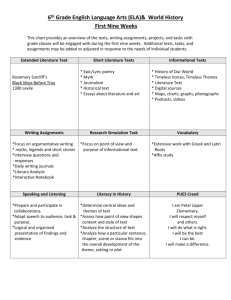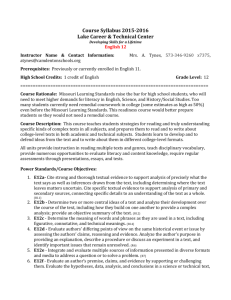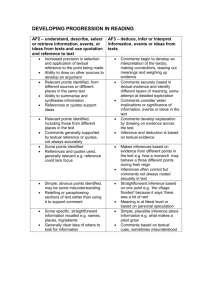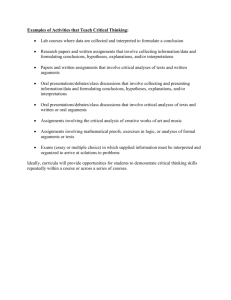Advanced Placement Literature
advertisement
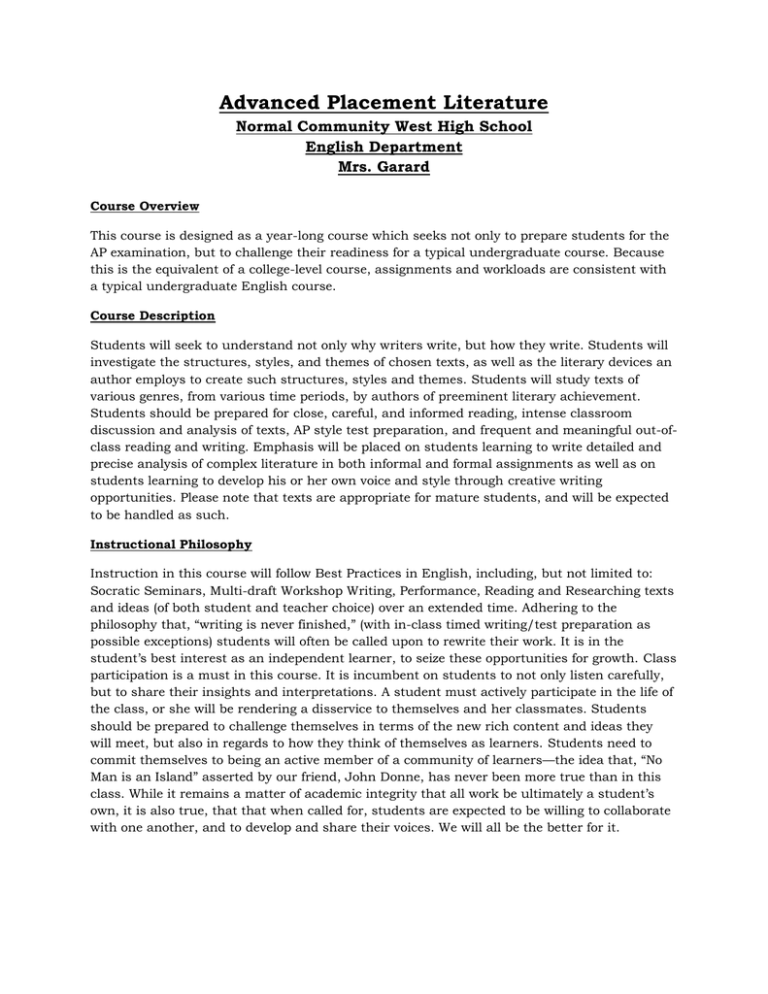
Advanced Placement Literature Normal Community West High School English Department Mrs. Garard Course Overview This course is designed as a year-long course which seeks not only to prepare students for the AP examination, but to challenge their readiness for a typical undergraduate course. Because this is the equivalent of a college-level course, assignments and workloads are consistent with a typical undergraduate English course. Course Description Students will seek to understand not only why writers write, but how they write. Students will investigate the structures, styles, and themes of chosen texts, as well as the literary devices an author employs to create such structures, styles and themes. Students will study texts of various genres, from various time periods, by authors of preeminent literary achievement. Students should be prepared for close, careful, and informed reading, intense classroom discussion and analysis of texts, AP style test preparation, and frequent and meaningful out-ofclass reading and writing. Emphasis will be placed on students learning to write detailed and precise analysis of complex literature in both informal and formal assignments as well as on students learning to develop his or her own voice and style through creative writing opportunities. Please note that texts are appropriate for mature students, and will be expected to be handled as such. Instructional Philosophy Instruction in this course will follow Best Practices in English, including, but not limited to: Socratic Seminars, Multi-draft Workshop Writing, Performance, Reading and Researching texts and ideas (of both student and teacher choice) over an extended time. Adhering to the philosophy that, “writing is never finished,” (with in-class timed writing/test preparation as possible exceptions) students will often be called upon to rewrite their work. It is in the student’s best interest as an independent learner, to seize these opportunities for growth. Class participation is a must in this course. It is incumbent on students to not only listen carefully, but to share their insights and interpretations. A student must actively participate in the life of the class, or she will be rendering a disservice to themselves and her classmates. Students should be prepared to challenge themselves in terms of the new rich content and ideas they will meet, but also in regards to how they think of themselves as learners. Students need to commit themselves to being an active member of a community of learners—the idea that, “No Man is an Island” asserted by our friend, John Donne, has never been more true than in this class. While it remains a matter of academic integrity that all work be ultimately a student’s own, it is also true, that that when called for, students are expected to be willing to collaborate with one another, and to develop and share their voices. We will all be the better for it. Teacher/Student/Parent Communication Expectations In an effort to prepare students enrolled in this course for college next year, I urge parents to have their student resolve any problems in the course through one-on-one work with me. If this process does not resolve the concern, then I urge parents to contact me directly. I update the Skyward Grade Program at least weekly, if not more often, so students and parents are able to monitor students’ progress carefully. Please note that as assignments are weighted differently by category, a student’s grade may fluctuate throughout the semester, and should not necessarily be immediate cause for concern—especially if student is in the process of rewriting—which will be frequently. Texts and Materials Poetry-as selected Excerpts from Poetics-Aristotle Excerpts from the King James Version of the Bible-as selected Brave New World (Summer Read)-Aldous Huxley Antigone-Sophocles Their Eyes Were Watching God-Zora Neale Hurston Othello-Shakespeare Much Ado About Nothing-Shakespeare Candide-Voltaire Heart of Darkness-Joseph Conrad The Poisonwood Bible-Barbara Kingsolver Sula-Toni Morrison Independent Novels-as selected Short fiction and essays-as selected Major Assignments and Projects Major assignments include, but are not limited to: Poetry Device Analysis Researched Paper College Entrance Essay Creative Imitation Annotated Bibliography What It Means To Be Human Project Character Analysis Theme Analysis Assessment and Grading Essays/Researched Papers 30% Practice Exams/Timed Writings/Quizzes 25% Presentation/Performance 25% Class Participation (Including Vocabulary Study)/Dialectical Journals 20% *I will use an AP style rubric to assess most writing in this course. AP Grading Scale 9 100 8.5 97 8 94 7.5 91 7 88 6.5 85 6 82 5.5 78 5 75 4.5 72 4 69 3.5 66 3 63 2.5 60 2 57 1 50 Absences/Late Work Due to the nature of this course, it is imperative that students miss class as infrequently as possible. If students are absent, they are responsible for inquiring about, and gathering all missed assignments. Late work, while never advisable is, I understand, occasionally unavoidable. It is my general policy to give students a “pass” the first time late work occurs, but I reserve the right to meet subsequent and especially repeated violations, with some form of penalty. Academic Integrity Students who are determined to have been dishonest in taking an exam will suffer the loss of all credit for said exam. Students found to have committed plagiarism shall suffer the loss of all credit for the project within which the plagiarism is found. Other consequences may also be invoked if deemed to be necessary by teacher and/or administration. Materials 1. Students need to keep an updated 3-Ring Binder. 2. Students will need a notebook/journal, and a ready supply of paper and pens. 3. Students will need a stash of Post-It notes. Course Goals Goals for the course are three parts: 1. Standards set by the College Board for A.P. Literature 1. Intensive Study of representative works such as those authors cited in the AP English Course Description 2. Write an interpretation of a piece of literature that is based on a careful observation of textual details, considering: a. such elements as the use of figurative language, imagery, symbolism and tone. b. a work’s structure, style and themes. c. the work’s social, cultural and/or historical values. 3. Frequent opportunities for students to write and rewrite: a. timed, in-class responses. b. formal, extended analyses outside of class. 4. Students should write to understand and discover what they think in the process of writing about their reading. 5. Students should write to explain, in which they draw upon textual details to develop an extended interpretation of a literary text. 6. Students should write to evaluate in which they draw upon textual details to make and explain judgments about a work’s artistry and quality. 7. Students should write to evaluate in which they draw upon textual details to make and explain judgments about a work’s social, historical and/or cultural values. 8. Students should receive teacher feedback both before and after revising their work to help students to develop: a. a wide-ranging vocabulary b. a variety of sentence structures c. logical organization d. a balance of generalization and specific, illustrative detail e. a controlling tone and voice appropriate to writer’s audience. 2. The study, and eventual answering of, the Essential Course Questions: a. How does literature reflect the human condition? b. How does it help us understand ourselves and others? c. How does literature express universal themes? 3. Personal Goals set by students at the beginning and throughout the course.
